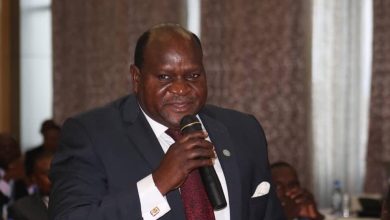‘Election is only part of Nice Trust’s work’
With three months to the September 16 General Election, Malawians are geared to vote for their preferred candidates for President, members of Parliament and councillors. One of the key players to the elections is the National Initiative for Civic Education (Nice) Trust which has a huge role to educate people about the elections. Our Staff Writer EDWIN NYIRONGO asked Nice Trust chief executive GRAY KALINDEKAFE to shed light on their work so far. Excerpts:

Q. How is civic education going on?
A. Nice has been on the ground for the September 16 2025 for the past two or so years. We are not only talking about preparations, but also progressively moving towards the elections day. In the first place, Nice Trust plays multiple roles in elections. First, provision of civic and voter education to raise awareness and mobilise eligible Malawians to participate in the elections as a right enshrined in the Constitution. Second, we observe the elections at all stages and, third, we conduct peace-building sessions alongside other players and actors, including supporting the capacity of multi-liaison committees that the Malawi Electoral Commission (MEC) established in all districts and district peace and unity committees in selected districts.
Q. What areas of the electoral process do you think people need civic education?
A. It is important to ensure that people are provided with adequate civic education. Among the key measures for the success are understanding the importance of voting, and voting. People need to be reminded about this through civic education. Voters should understand how to mark the ballots to reduce the number of void votes. For this to happen, people need correct and adequate civic education. Again, civic education is needed to ensure that we have a violent-free environment. Civic education is also needed to ensure that voters are motivated to vote, and vote correctly.
Q. Do you have the required personnel for this enormous task?
A. We have over 10 000 volunteers that support civic education interventions at village level. Apart from government and the faith community, we are convinced that we are the third largest organisation in terms of outreach. It is possible to do multiple implementation, conducting up to 20 civic education outreach activities in a day in a district.
Q. Aren’t you accused of bias considering that you are more like a government entity?
A. It is important to understand the way Nice Trust is constituted and how it operates. Our legal status is that of a public trust, an independent institution that exists to provide civic education. Its constitution is very clear in ensuring autonomy and guarding it from political interference. Government has the primary role of providing civic education to its citizens. We have an independent board of trustees that facilitates the nomination of potential members by established civil society institutions for consideration. Through that process, which is facilitated in a transparent manner— involving a task force made up of institutions such as Council for Non-governmental Organisations in Malawi (Congoma), the Comptroller of Statutory Corporations and selected government institutions. As such, Nice is insulated from political manipulation because nobody can just wake up and issue instructions against our operations that are strictly guided by the pillars of our strategic plan.
Q. You closed offices in some districts. Isn’t this affecting your work?
A. No office has been closed only that there was a time some three years ago when we had staff shortages, but this was rectified and all our offices are fully functional. We have offices in all districts, including Likoma and these are managed by trained and experienced officers called district programmes officers. Additionally, we have the support of more than 10 000 volunteers who are at community level and these enhance our outreach capacity.
Q. It must be an expensive adventure. Who funds you?
A. Indeed, civic education is a resource-intensive undertaking. We have major funding from European Union under a programme called Boma Lathu and we are so grateful for this rare opportunity. As a public trust, we also receive some subvention from government, but we are being squeezed hard by the rising inflation and increasing demand for our services, especially that out of the 116 MEC-accredited institutions, only a handful are on the ground.
Q. What’ your take on fear that some of your members could be biased towards certain political parties?
A. Nice Trust has rigorous recruitment processes that involve several institutions like the Department of Human Resource Management and Development, the relevant directorate of the mother ministry and civil society partners to ensure that right people are shortlisted and employed. Additionally, we have a code of conduct that is signed by every employee and is strictly non-partisan. D i s c i p l i n a r y p r o c e s s e s follow for any misconduct in this regard.
Q. But there are claims that you fail to reach some areas where people need civic education most?
A. That may not be accurate because the Nice Trust operational structure is extended to the community or village level. Our programming at district level reaches all parts of the district jurisdictions and one key measure of performance for our district staff is to demonstrate, through a map, that they are reaching out to all parts of every district. As indicated, we have offices in all the districts in the country, including hard-to-reach districts like Neno and Likoma. Our critical pool of 10 000 volunteers are spread in almost all villages in the country so we can confirm that our services are available even in the hard-to-reach areas.
Q. What will Nice be doing after elections?
A. In brief, our work is much broader than elections as we also focus on good governance. After the elections, Nice will shift its focus towards post-election civic engagement and democratic strengthening. We plan to conduct voter feedback sessions to assess the electoral process and identify areas for improvement. We will also launch public forums to encourage dialogue on governance, accountability and policy implementation. There will also be leadership training programmes for young people and newly-elected officials, including councillors. So, we will do a number of activities.
Q. Summarise your work and preparedness for the elections
A. All I can say is that Nice has a long-term focus through a strategic plan. Our work revolves around improving citizens’ capacity to effectively engage and participate in the electoral processes at all levels, including electoral reforms, capacity-building and awareness on elections and elections related issues as well as supporting the monitoring and observation of different stages of the electoral process. We have been involved in awareness for the ward and cons t i t u e n c y border demarcation exercise by MEC, the new electoral laws as well as orientation of different stakeholders like traditional leaders, faith leaders and other gate-keepers.





